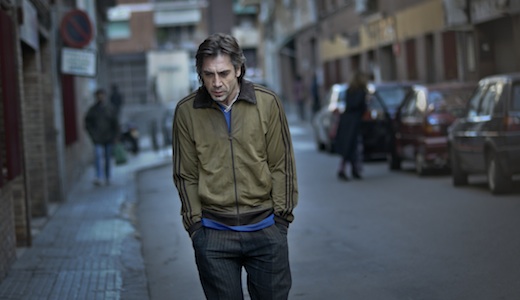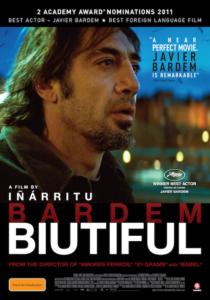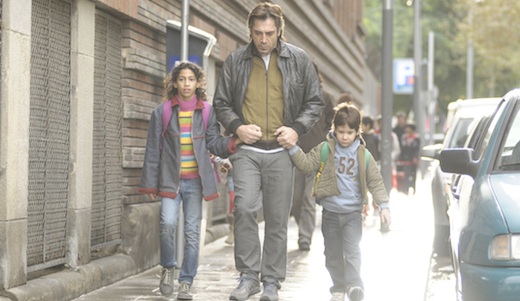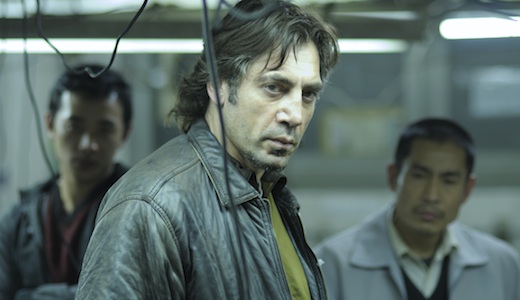The films of Mexico’s Alejandro González Iñárritu have always dealt with the fragile connections between humans across the globe, exploring the idea that the same fine line that separates life and death also connects every person on the planet.
In his three previous films – Amores Perros, 21 Grams and Babel – Iñárritu examined the world with in all of its ‘butterfly effect’ beauty. Collaborating with screenwriter Guillermo Arriaga (The Three Burials of Melquiades Estrada), the three films used multiple lines and fractured structures to connect the seemingly disconnected. With the Oscar-nominated Biutiful, Iñárritu has said that he seeks to do something that he hasn’t done before: “a linear story whose characters shape the narrative in an unexplored genre for me: the tragedy”.
Biutiful is described as a love story between a father and his children. Uxbal (Javier Bardem, Eat Pray Love) is surviving on the fringes of Barcelona, involved in underground businesses, spiritual sensitivity and people trafficking. As Uxbal finds out that death is close at hand, the nature of his relationship with his two children, his manic-depressive ex-wife (Maricel Álvarez) and the world around him begins to change as well.
Iñárritu may argue that Biutiful is a tragedy, and while it is undoubtedly about a series of tragic events and tinged with sadness, it is also (as the title would imply) a celebration of the beauty of life. Iñárritu may claim that this is his most straightforward narrative piece to date, and while it is true that it doesn’t experience the same non-linear time jumps and cuts that his previous works have, it is as richly textured with the culture and stories of the people of Barcelona’s Santa Coloma region as his earlier globe-trotting efforts.
Historically, the Catalan-culture was disrupted when Francisco Franco brought to Catalonia hundreds of thousands of people from different parts of Spain, outlawing the Catalan language. As such, the non-Catalan Spanish citizens (speaking the official Castilian Spanish) were immigrants in their own country, known as “Charnegos”. When the “Charnegos” left during the economic upturn of the 1980s and 1990s, immigrants from around the world filled Santa Coloma.
Knowing this historical context greatly enhances one’s appreciation for how textured the characterisations are in Biutiful. Iñárritu has said that he “wrote a meticulous biography of each one of the characters”, from the African associates of Uxbal to the tragedy of the Chinese day-labourers under Uxbal’s care. While we have no way of knowing these biographies from the action on-screen, even in the lengthy 148 minute running time, there is an unspoken weight to each of their actions.
Unlike Iñárritu’s previous works, particularly Babel, where an ensemble of actors helped weave together disparate stories in a cohesive whole, Bardem is asked to carry the entire weight of the film on his shoulders. Bardem can bring great charisma (Vicky Christina Barcelona), terror (No Country for Old Men) and incredibly pathos (The Sea Inside), and in Biutiful he simultaneously draws on all of these things before throwing them away. Rarely have we seen Bardem so stripped bare, giving a raw performance that cuts to the core of humanity and gives us so much more than a man going through the motions before his final moments.
Uxbal, and by extension Bardem, is a man haunted and his presence in almost every scene only adds to the sheer physical exhaustion of the character. An important element to his character is that he is a spiritual sensitive, and while this may be dismissed in a modern world, that he is quite literally haunted by the dead as he becomes aware of his own abbreviated mortality, and adds a sense of urgency to what he must do in his closing days.
Yet Biutiful is not about death, and getting one’s business in order before dying. Just as with Kurosawa’s Ikuru, the growing realisation that nothing can be done about death is coupled by the acknowledgment that in order to be truly happy, one must suffer first. In that film, Kenji Watanabe (Takaski Shimura) channels his attentions into the construction of a public park. For Uxbal, it is his children. Biutiful is a recognition that we are still alive and connected to each other in more ways than we could possibly know.
The Reel Bits: After four years away from our big screens, Iñárritu delivers one of his most personal and poignant films to date. The performances are outstanding, especially Bardem who carries much of the emotional weight of the film. If ever there was a film that could be summed up by using its title alone, this would be it.
Biutiful is released on 24 March 2011 in Australia by Madman Entertainment.









No Responses